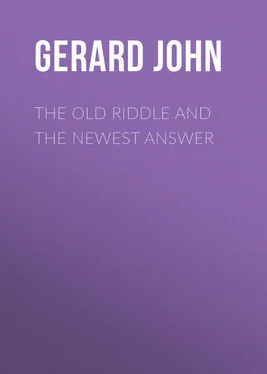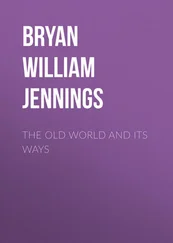John Gerard - The Old Riddle and the Newest Answer
Здесь есть возможность читать онлайн «John Gerard - The Old Riddle and the Newest Answer» — ознакомительный отрывок электронной книги совершенно бесплатно, а после прочтения отрывка купить полную версию. В некоторых случаях можно слушать аудио, скачать через торрент в формате fb2 и присутствует краткое содержание. Жанр: foreign_religion, foreign_antique, foreign_prose, на английском языке. Описание произведения, (предисловие) а так же отзывы посетителей доступны на портале библиотеки ЛибКат.
- Название:The Old Riddle and the Newest Answer
- Автор:
- Жанр:
- Год:неизвестен
- ISBN:нет данных
- Рейтинг книги:4 / 5. Голосов: 1
-
Избранное:Добавить в избранное
- Отзывы:
-
Ваша оценка:
- 80
- 1
- 2
- 3
- 4
- 5
The Old Riddle and the Newest Answer: краткое содержание, описание и аннотация
Предлагаем к чтению аннотацию, описание, краткое содержание или предисловие (зависит от того, что написал сам автор книги «The Old Riddle and the Newest Answer»). Если вы не нашли необходимую информацию о книге — напишите в комментариях, мы постараемся отыскать её.
The Old Riddle and the Newest Answer — читать онлайн ознакомительный отрывок
Ниже представлен текст книги, разбитый по страницам. Система сохранения места последней прочитанной страницы, позволяет с удобством читать онлайн бесплатно книгу «The Old Riddle and the Newest Answer», без необходимости каждый раз заново искать на чём Вы остановились. Поставьте закладку, и сможете в любой момент перейти на страницу, на которой закончили чтение.
Интервал:
Закладка:
It is in this form alone that Force becomes subject to observation and can be measured by Science, and the Law of Conservation which observation reveals is thus stated: The sum of all the various energies in the universe is a constant quantity, which can be neither increased nor diminished, though it may be changed from one form to another; 36 36 Balfour Stewart, Conservation of Energy , § 115; by Clerk-Maxwell, apud Garnett, ut sup.
such forms being motion, heat, chemical action, electricity, magnetism.
But another point is of far greater importance. The mode in which Professor Haeckel states this fundamental Law is altogether deceptive. He tells his readers only half the truth, and when the other half is told, not only is his whole doctrine found to receive no support from the Laws of Energy, but it is these very Laws which appear most incompatible with it.
For, along with the Law of the Conservation, there is another, of the Dissipation of Energy. It is perfectly true, as Professor Haeckel often repeats, that the sum of Energy existing in the universe remains ever the same: but it is no less certain, as he unfortunately fails to remind his readers, that the stock of Energy available for the work of the universe is growing less every day. Though none is ever destroyed, much is constantly lost , being dissipated, or radiated into space, in the form of heat which can never be recaptured or translated into any form which can be of any practical avail. "It is lost for ever as far as we are concerned." 37 37 Tyndall, Fragments of Science , 5th Edition, p. 23.
From what we have heard concerning the Law of Substance it might naturally be supposed that it certified us of the continued existence of the power required to carry on the operations of Nature, and that, accordingly, reason bids us to suppose these operations to be everlasting. But this neglected element of the reckoning, or Entropy as it is styled, leads scientific men to an entirely different estimate. Thus Professor Balfour Stewart writes: 38 38 Conservation of Energy , § 209.
Although, therefore, in a strictly mechanical sense, there is a conservation of energy, yet, as regards usefulness or fitness for living beings, the energy of the universe is in process of deterioration. Universally diffused heat forms what we may call the great waste-heap of the universe, and this is growing larger year by year.
We have [he continues] regarded the universe, not as a collection of matter, but rather as an energetic agent – in fact, as a lamp. Now it has been well pointed out by Thomson, 39 39 Sir William Thomson, now Lord Kelvin.
that looked at in this light, the universe is a system that had a beginning and must have an end; for a process of degradation cannot be eternal. If we could view the universe as a candle not lit, then it is perhaps conceivable to regard it as having been always in existence; but if we regard it rather as a candle that has been lit, we become absolutely certain that it cannot have been burning from eternity, and that a time will come when it will cease to burn. We are led to look to a beginning in which the particles of matter were in a diffuse chaotic state, but endowed with the power of gravitation, and we are led to look to an end in which the whole universe will be one equally heated inert mass, from which everything like life or motion or beauty will have utterly gone away.
It is doubtless true that attempts have been made to show that this conclusion is not final, and that there may be resources whereby Nature is able to recoup herself, and to draw upon some bank unknown to us for her missing store. As we have seen, Professor Haeckel simply takes for granted that some such means of recuperation exist and operate, and he is not wholly without countenance from others. Thus, no less an authority than Sir William Crookes addressing the Chemical Society as its president, thus expressed himself: 40 40 March 29, 1888.
If we may hazard any conjectures … we may I think premise that the heat radiations propagated outwards, … by some process of nature unknown to us, are transformed at the confines of the universe into the primary – the essential – motion of chemical atoms, which the instant they are formed, gravitate inwards, and thus restore to the universe the energy which would be lost to it through radiant heat. Hence Sir William Thomson's startling prediction falls to the ground.
But it need not be pointed out that if an advocate so eminent as Sir William Crookes is reduced to pleas like this on its behalf, the case for Renovation of Energy must be singularly destitute of anything resembling scientific support. Suppositions which are avowedly hazarded as conjectures, and which must appeal to processes of Nature of which we know nothing, whatever authorship they may boast, have nothing to do with Science, and possess no sort of value for our purpose. 41 41 So of another effort in the same direction Capt. Hutton tells us: "The last champion in the field is Professor A. W. Bickerton, who thinks he has found a way in which this dismal conclusion, as he considers it, may be averted. But he is not very sure about it, and has to assume: first, that space contains now and always will contain, a large quantity of cosmic dust scattered through it with some approach to uniformity; and secondly, that the Universe consists of an infinite number of what he calls 'cosmic systems,' travelling through space, constantly throwing off dust in all directions and occasionally colliding. As all this is pure assumption and highly improbable, I cannot think that Professor Bickerton has brought forward any serious objection to the theory of the dissipation of energy, and his hypothesis must be added to the list of failures." ( Lesson of Evolution , p. 14, n. )
It must of course be allowed that we may still be utterly in the dark as to the whole of this question, and that further discoveries may one day completely upset all our present notions. But we are concerned with the evidence which Science has now before her, and with the assertion so confidently advanced that this makes the Law of ceaseless Evolution an indisputable truth. We find, on the contrary, that this Law runs directly counter to the facts as they are at present known to us, and to the conclusions drawn from them by the most authoritative representatives of science.
Nor is it only our own globe and solar system that appear to be thus bound towards an inevitable doom. The eternal rhythm of life and death, of which we have been told as pervading the endless depths of space, has no better title to scientific sanction. Like the minor province which we inhabit, the whole universe, we are assured, – so far as we have means of calculating, – must ultimately arrive at a condition of eternal stagnation, – its component parts being drawn close together by their mutual attractions, – so that motion ceases; while the heat replacing it being equally diffused, becomes as incapable of doing work as water between two pools on the same level is of turning a mill. As the writer lately quoted sums up the matter: 42 42 Lesson of Evolution , p. 14.
Slow as the process of condensation is, it is not endless. In time all the meteoric dust will be collected into stars or planets; and in time the law of dissipation of energy will bring all these bodies to a uniform temperature. So at last the movements due to the original unequal distribution of matter will cease, and the life of the universe will come to an end. We know of no process of rejuvenescence, by means of which dissipation of energy and the force of gravitation might be counteracted. Several attempts have been made to refute the theory of the dissipation of energy, but all have failed.
Читать дальшеИнтервал:
Закладка:
Похожие книги на «The Old Riddle and the Newest Answer»
Представляем Вашему вниманию похожие книги на «The Old Riddle and the Newest Answer» списком для выбора. Мы отобрали схожую по названию и смыслу литературу в надежде предоставить читателям больше вариантов отыскать новые, интересные, ещё непрочитанные произведения.
Обсуждение, отзывы о книге «The Old Riddle and the Newest Answer» и просто собственные мнения читателей. Оставьте ваши комментарии, напишите, что Вы думаете о произведении, его смысле или главных героях. Укажите что конкретно понравилось, а что нет, и почему Вы так считаете.












